Vein diseases are prevalent and affect people of all ages and backgrounds. They can lead to severe health complications and negatively impact an individual’s quality of life. Fortunately, one can adopt many healthy habits to prevent vein diseases. This article outlines some of the most effective ways to prevent vein diseases.
Types of Vein Diseases
Before delving into how to prevent vein diseases, it is essential to understand what they are. Vein diseases are conditions that affect the veins responsible for carrying blood from different parts of the body back to the heart. Blood can accumulate when these veins become damaged, leading to various health problems. There are several types of vein diseases, including:
● Varicose Veins
Varicose veins are swollen, twisted, and enlarged veins that usually occur in the legs. They can be painful and uncomfortable and may also cause itching and swelling.
● Spider Veins
Spider veins are smaller than varicose veins and appear closer to the skin’s surface. They are often red or blue and may look like a spider web or tree branch. They are usually painless but may cause some discomfort or aching.
● Deep Vein Thrombosis (DVT)
DVT is a blood clot that forms in a deep vein, most commonly in the leg. It can be a serious condition, as the clot can break off and travel to the lungs, causing a pulmonary embolism.
● Chronic Venous Insufficiency (CVI)
CVI occurs when the valves in the veins do not function properly, causing blood to flow backward and pool in the legs. This can lead to swelling, skin changes, and ulcers.
● Venous Ulcers
Venous ulcers are open sores on the legs or ankles due to poor blood flow. They are often painful and slow to heal.
If you suspect you have a vein disease, it’s important to seek medical attention, and you can visit the Vein Health Clinics website for information on proper diagnosis and treatment.
Healthy Habits That Are Beneficial To Strong And Healthy Veins
Maintaining a Healthy Weight
Maintaining a healthy weight is essential for preventing vein diseases. Being overweight or obese puts extra pressure on the veins, making them more susceptible to damage. It is recommended that individuals maintain a healthy diet and engage in regular physical activity to achieve and maintain a healthy weight.
Regular Exercise
Regular exercise is another vital habit for preventing vein diseases. Exercise helps improve blood flow, which is crucial for maintaining healthy veins. Most days of the week, individuals are recommended to engage in at least 30 minutes of moderate-intensity exercise, such as walking, jogging, or cycling.
Wearing Compression Stockings
Compression stockings are specially designed to pressure the legs and improve blood flow. They effectively prevent vein diseases, especially for individuals who spend long periods standing or sitting. It is recommended that individuals wear compression stockings during extended periods of inactivity, such as during long flights or car rides.
Avoiding Prolonged Sitting or Standing
Prolonged sitting or standing can pressure the veins, leading to vein diseases. Taking regular breaks and changing positions regularly is essential to promote healthy blood flow. Individuals who spend long periods sitting or standing should try to take short breaks and move around frequently.
Elevating the Legs
Elevating the legs is an effective way of reducing pressure on the veins and promoting healthy blood flow. It is recommended that individuals elevate their legs for at least 15 minutes several times a day, especially after long periods of standing or sitting.
Drinking Plenty of Water
Staying hydrated is crucial for maintaining healthy veins. Drinking plenty of water helps keep the blood flowing smoothly and reduces the risk of blood clots. It is recommended that individuals drink at least eight glasses of water a day to maintain optimal hydration.
Eating a Healthy Diet
Eating a healthy diet rich in fruits, vegetables, and whole grains is essential for preventing vein diseases. These foods contain essential nutrients that promote healthy blood flow and reduce inflammation, which can damage the veins.

Avoiding High Heels
High heels can put pressure on the veins, leading to vein diseases. It is recommended that individuals avoid wearing high heels for extended periods, especially when standing or walking for long periods.
Avoiding Tight Clothing
Tight clothing can restrict blood flow, leading to vein diseases. It is recommended that individuals avoid wearing tight clothing, especially around the waist, thighs, and legs.
Quitting Smoking
Smoking can damage the veins, leading to vein diseases. Quitting smoking is essential to preventing vein diseases and maintaining overall health.
Managing Chronic Conditions
Chronic conditions like diabetes and high blood pressure can increase the risk of developing vein diseases. It is essential to manage these conditions effectively through medication, diet, and lifestyle changes to prevent vein diseases.
Regular Checkups
Regular checkups with a healthcare provider are essential for preventing vein diseases. Healthcare providers can monitor an individual’s health and identify potential vein diseases early on. Early detection and treatment can prevent serious complications and improve outcomes.
Taking Breaks During Long Trips
Long trips, whether by car or plane, can increase the risk of developing vein diseases due to prolonged periods of inactivity. It is recommended that individuals take regular breaks to stretch their legs and move around to promote healthy blood flow.
Managing Stress
Stress can have a negative impact on overall health, including the health of the veins. It is recommended that individuals manage stress through relaxation techniques such as deep breathing, meditation, or yoga.
Final Thoughts
Preventing vein diseases requires healthy habits such as maintaining a healthy weight, regular exercise, wearing compression stockings, and avoiding prolonged sitting or standing.
Other essential habits include elevating the legs, drinking plenty of water, eating a healthy diet, avoiding high heels and tight clothing, quitting smoking, managing chronic conditions, and regular checkups. Regular breaks during long trips and managing stress are also essential for preventing vein diseases.







